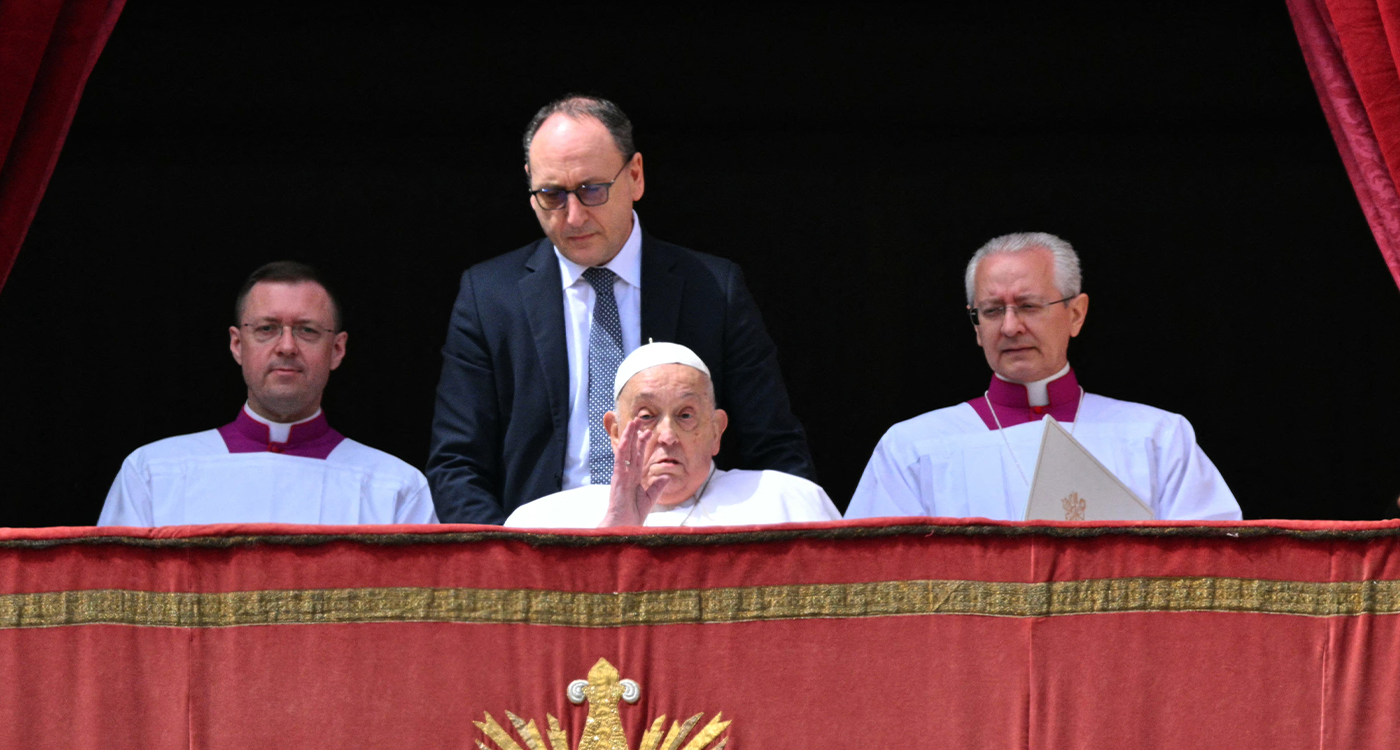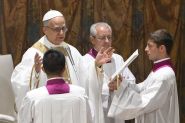- Home
- Middle East
- Servant of the World: The Heavy Mantle Facing the Next Pope

©Andreas SOLARO / AFP)
Following the death of Pope Francis on April 21, a conclave is set to convene in early May to elect his successor as the leader of the Catholic Church. The 267th pope will face formidable challenges in continuing the mission of this 2,000-year-old institution and spreading the message of Jesus.
This responsibility is particularly daunting in a world marked by conflict and growing secularism, compounded by deep internal divisions within the Church, still grappling with the fallout from sexual abuse scandals.
“The challenges remain the same,” says Father Dominique Lubot of the Notre-Dame de Luçon parish in France, speaking to This is Beirut. “The Catholic Church must remain faithful to the Gospel and to the message of Jesus, while ensuring its teachings and practices are meaningfully aligned with the realities of today’s world. Not to conform to the world’s desires, but to respond to its deepest questions and challenges,” he adds.
In recent decades, new challenges have emerged, including artificial intelligence, the influence of social media, ecological urgency, globalization, immigration and bioethical dilemmas.
Remaining “Audible” in the World
The decline in baptisms and religious practice, particularly in Europe, presents a significant challenge for the Church, which is increasingly struggling to make its voice heard. For example, in France, the number of baptisms for children under 3 has fallen from 400,000 to fewer than 200,000 over the past twenty years, according to La Croix, though adult baptisms have seen an increase in recent years. This trend is mirrored across Europe, where vocations to the priesthood and religious life are also on the decline.
In a more secularized world, the voice of Christians—and of the pope—seems increasingly unheard, and the Holy See must adapt to this new reality. “For me, the greatest challenge is how to remain audible in a world that is rapidly changing,” says Father Gabriel Khairallah, a Jesuit professor at Saint Joseph University in Beirut (USJ), speaking to This is Beirut.
“The pope is first and foremost the leader of the Catholic Church, but in my view, he must also be the voice of the voiceless: immigrants, marginalized individuals, and those in need who often go unheard,” he adds, noting that “in a sense, the pope is a mediator—a mediator of humanity, a mediator of charity in its truest sense, and above all, a servant of the world.”
Indeed, the pope is both the principal representative of Christianity in the world, owing to his fame and media influence, and the leader of the Catholic Church, a role that requires direct communication with the faithful while staying true to the Church’s values.
“The pope must also embody an attitude that reflects these values—an evangelical attitude, marked by simplicity and poverty,” says Father Lubot. “This is certainly true of Pope Francis, who sought to simplify the papacy’s grandeur in order to live a more modest life.”
Ongoing Reforms
From the very beginning of his pontificate, Pope Francis has been committed to reforming the Catholic Church, particularly in the Vatican’s curial institutions and the pastoral care of families.
By condemning what he calls “clericalism”—the deep divide between the clergy and the faithful—he seeks to transform the Curia into “a tool more oriented toward the world” through the introduction of the new apostolic constitution, Praedicate Evangelium. In 2013, he also initiated a reform of the Vatican Bank, which had been plagued by financial scandals. These reforms have generated significant opposition within the Church.
“The Church is alive, and like any living institution, it must reform to stay true to the Gospel. Even now, some reforms are underway: more synodality, deeper listening to the people of God, reflection on the role of women, ministries, and governance...” says Father Jean-Paul Iba from Libreville, Gabon, speaking to This is Beirut.
The next pope will likely continue these reforms, building on the foundation laid by his predecessor, though he may choose to focus on other priorities as well.
The role of women has been a pivotal issue under Pope Francis, as he has appointed more women to positions of authority in the Vatican and dioceses. For example, on November 4, 2021, he appointed Italian Franciscan Sister Raffaella Petrini to oversee the management of the Vatican Museums, postal service, and police. In July 2023, he named 35 women to the plenary assembly of the Synod of Bishops.
This marks a profound shift in a Church traditionally dominated by men. However, some Catholic feminists continue to lament the refusal to ordain women.
“The future pope will need to discern, with the guidance of the Holy Spirit, what must be transformed, without betraying the faith, but making it more accessible, more authentic, and more incarnate,” adds Father Iba.
Global Challenges Ahead
With its universal mission, the Catholic Church is present across all five continents, each facing its own unique challenges. In Europe, the decline in vocations to the priesthood and religious life will be a key issue for the next pope.
“We would be glad if the next pope paid particular attention to old Europe,” says Father Lubot, adding that “another challenge is the ongoing pedophilia crisis, which remains unresolved and must continue to be addressed.” The pedophilia scandals have deeply shaken the Church in Europe, with new cases continuing to surface.
Father Iba, on the other hand, believes that in Africa, “the greatest challenge may be reconciling the Christian faith with African realities, without blindly imitating the West or falling into shallow religiosity. We need a Church that is rooted in African culture, yet faithful to the Gospel.”
He also points to the rapid growth of sects that attract many with promises of quick fixes. However, he stresses that “the issues of poverty, inequality, and corruption are equally critical. The Church cannot remain silent in the face of these injustices.”
In Lebanon and the wider Middle East, Father Khairallah echoes similar concerns, asking, “How will the Church in Lebanon, amidst its ongoing economic, social, financial, and political crises, be able to hear the voices of the disadvantaged?”
Another challenge in the region, he notes, is the “dialogue and interaction with other religions, particularly Islam and Judaism, especially in the context of the Church in the Holy Land.”
A particularly demanding agenda awaits the next successor of Pope Francis, under the watchful eye of the global Christian community.
Read more




Comments